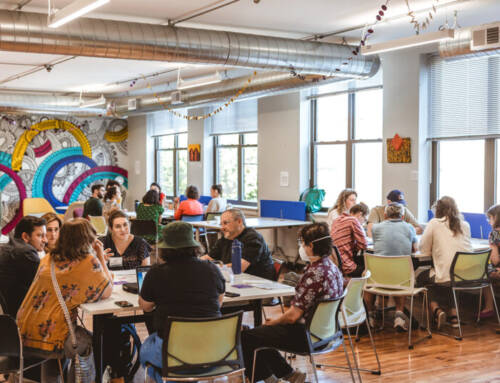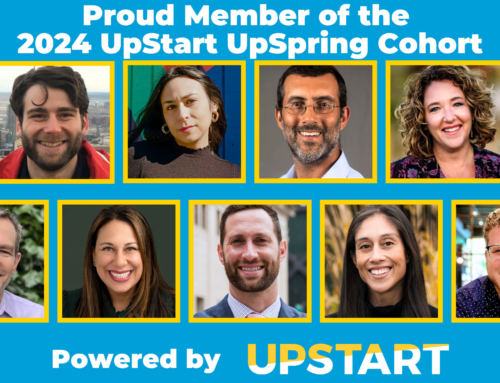Each year I wrestle with the Passover story: Now we are slaves. Next year, may we all be free. What does it mean to be slaves? What would it mean to be free? The haggadah commands that in every generation we are to experience Passover as if we ourselves went out from Egypt to freedom.
I see our generations slavery in the environmental crisis and a crisis of personal isolation caused by our fast-paced society, which often prizes consumption over human connection. If this is our slavery, then our freedom is building multigenerational community and reconnecting to the natural world its living our Exodus story for today by celebrating Passover in the Desert.
Not so long ago, we Jews were connected to the land, the seasons, and the cycles of the sun and moon. We were connected to one another as we wandered the desert, tended our flocks and celebrated our agricultural festivals. Sadly, we have largely forgotten our ancestral connection to Creation; that our holidays are rooted in the seasonal cycle.
Today I see a yearning for something we had back in the desert when we circled our tents together. You can see it in our obsession with text messaging and the endless hours we spend on Facebook. You see it in a bustling farmers market, where we meet our farmers and pay extra for blueberries grown nearby.
Our yearning to connect with the natural world is not just about food, however. Research shows that connection to the natural world is an essential part of human health.
In Last Child in the Woods: Saving Our Children from Nature-Deficit Disorder, Richard Louv provides sobering proof that our society is teaching young people to avoid direct experience in nature at the cost of mental, spiritual and physical health. Citing research that the rise in attention deficit disorder, obesity and autism is directly related to what he calls nature-deficit disorder, Louv concludes that [t]ime in nature is not leisure time; its an essential investment in our childrens health (and also, by the way, in our own).
Spending time in nature for personal health is just the beginning. The Torah teaches that in the wilderness God speaks most clearly and we encounter the Divine most directly. Moses discovers the burning bush while wandering in the wilderness with his sheep there he begins his conversation with God. Jacob received his new name Israel, after wrestling with an angel in the wilds alone. Our tradition is full of tales of receiving prophecy, revelation, healing and wisdom all received while in the wilderness.
This is why it is essential for me to celebrate Passover in the Desert. Passover marks the season of freedom, renewal and the beginning of the yearly cycle. The desert air infuses me with a renewed perspective and I explore the deeper questions: What personal story of enslavement am I ready to leave behind? What is the freedom Im walking toward this year? How does my personal liberation help my communitys liberation? By leaving behind email, telephone and the other trappings of daily life, and stepping into the wilderness where I can more clearly hear the voice of the One, I tap into the ancient truth of the Exodus story.
During Wilder-ness Torahs five village-building days in the Panamint Valley, which resembles Israels Arava Desert, I find time to wander alone in the vast silence and listen deeply to the small still voice that guides me; I connect to my tribe and the growth, evolution and mutual respect that emerges when we gather together with common purpose; I connect to the deep blue skies, the breathtaking mountains and the bright spring blossoms; and I connect deeply to my Jewish roots, remembering that we Hebrews found our freedom in the desert.
The Sfat Emet, the late 18th-century Hassidic master, explains, Torah is renewed on Shavuot in accordance with the freedom that has been awakened on Passover. Even though we have already received the Torah, there is still a renewed revelation of Torah in each generation a revelation particular to the time. That is why freedom needs to be renewed each year.
Given the social and environmental crises of today, we must listen to this years unique revelation so that we may renew our relationship with ourselves, the Earth, our Jewish community and the whole world. By celebrating Passover in the Desert, we can awaken our ancient memory and understand the essential freedoms needed by our generations today.
Zelig Golden is the founder and co-director of Wilderness Torah, an UpStarter which sponsors land-based Jewish holidays and rituals, including Passover in the Desert April 11-15, 2012. Visit http://www.wildernesstorah.org for information. This piece first appeared in the J-Weekly.
Our purpose is to enable entrepreneurs to bring bold Jewish ideas to light. We help them reach Up to people in new ways that are meaningful, more inclusive, and create a brighter future for our Jewish community and the world we share.




